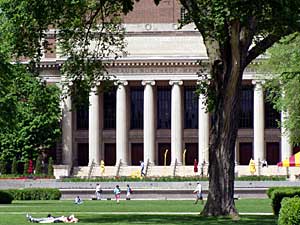Audio
Photos
More from MPR
Resources
| ||||||||||||||||||||||||||||||||||||
May 26, 2005
 |
| The University of Minnesota receives $105.5 million in new money over the next two years. (MPR Photo/Ted Clement) |
St. Paul, Minn. — Pawlenty said the money provided to the state's higher education institutions reflects an improving economy and gives "some breathing room to return to the positive side of the ledger."
"This bill represents great progress for Minnesota and for education, preparing Minnesota for its knowledge economy future," Pawlenty said. "We have the responsibility and the challenge and the exciting opportunity to make decisions, and lead Minnesota in a way that prepares our great state, that maintains its world-leading status in the knowledge economy."
Pawlenty signed the bill at the University Center Rochester to highlight a $3.2 million investment by the state to study the possibility of a four-year university there.
The session's outcome for higher education gets mixed reviews from college and university leaders. The University of Minnesota received a nearly 10 percent increase in funding, compared to the last budget session. Chief Financial Officer Richard Pfutsenreuter said that's about what officials expected.
"It was a good outcome for the university," he said. "We understood going in that the state faced some real serious financial challenges. We wanted to be realistic."
The $105 million increase for the U of M is less than requested. The original request would have kept tuition increases to 5.5 percent. Pfutzenreuter said the increase could now be as much as 7.5 percent. MnSCU officials also expect similar increases, but say they're lower than the past four years -- tuition rose 60 percent over that period.
Student representatives, who entered the session with the goal of keeping tuition flat, are disappointed.
"We have to let legislators know that students are being priced out of education," said Ed Day, a member of the Student Legislative Coalition at the University of Minnesota. He said the Legislature made progress, but still fell short.
"The last time that higher ed got a real significant boost was when Arne Carlson was governor," Day said. "While this is a step in the right direction, it's the first small step in six years or more, actually."
Shannah Moore of the MnSCU student association said the continuing tuition increases are a significant barrier for students wanting to enter the state-sponsored system.
"We've had so many stories from students who are working two or three jobs, and taking out tens of thousands of dollars in loans, and dropping classes they can't pay for," she said. "It's not helping the success of the state for these students not to be able to get an education."
The state appropriation for MnSCU is about $90 million less than requested. MnSCU Finance Officer Laura King said she expects lower enrollment in the next year, partly because of tuition hikes.
"We do worry about that," King said. "Because we know that some of the students we're most interested in getting to are turned away by the price."
While operating money may be a concern, both of the state-supported systems agree the bonding bill passed earlier in the session goes a long way toward paying for many repair and construction projects.
MnSCU received $217 million for capital needs. Associate Chancellor of Facilities Alan Johnson said that will pay for dozens of projects to update and expand spaces for students.
"That means renovation for academic programs primarily -- sciences, classrooms," Johnson said. "And that means in terms of a classroom, to upgrade it to a full technology-type classroom where there's audiovisual capability, things like that."
Among the projects MnSCU plans is an $11 million addition at St. Paul College and another $11 million renovation at Bemidji State University.
The University of Minnesota is moving ahead with a $17.4 million renovation of the chemistry department's Kolthoff Hall, and a $14.5 million overhaul of the now vacant Minerals Resources Research Building.







